Talk Intelligent Navigation: Reimagining First Contact in Healthcare IMOGEN LEVY — Head of Product at NHS England London 2025
A presentation at World IA Day London 2025 in March 2025 in London, UK by London World IA Day

Talk Intelligent Navigation: Reimagining First Contact in Healthcare IMOGEN LEVY — Head of Product at NHS England London 2025

Intelligent Navigation: Reimagining First Contact in healthcare Imogen Levy, Head of Product NHSE First Contact Programme WIAD London 2025 2

The Challenge of Healthcare Navigation 3

Today, the burden is on patients to understand how to access their care in the right way. • 1/3 of people contacting their GP could be more appropriately served by other services.¹ • Evidence suggests 40% of patients in A&E could be better treated elsewhere.² • 30% of patients struggle to get hold of their GP surgery.³ • 40% of 111 users get directed to primary care.⁴ There is a risk that patients can get stuck in loops between the GP and 111, when online consultations tools direct patients to 111 due to high demand. ¹ e-consult analysis, 2024, ²111 online usage data, Jan 2025, ³,⁴ GP National Patient Survey, 2024 4

The Patient Struggle – Confusion & Bottlenecks 5

Static IA vs. Dynamic IA Why Traditional Navigation Fails 6
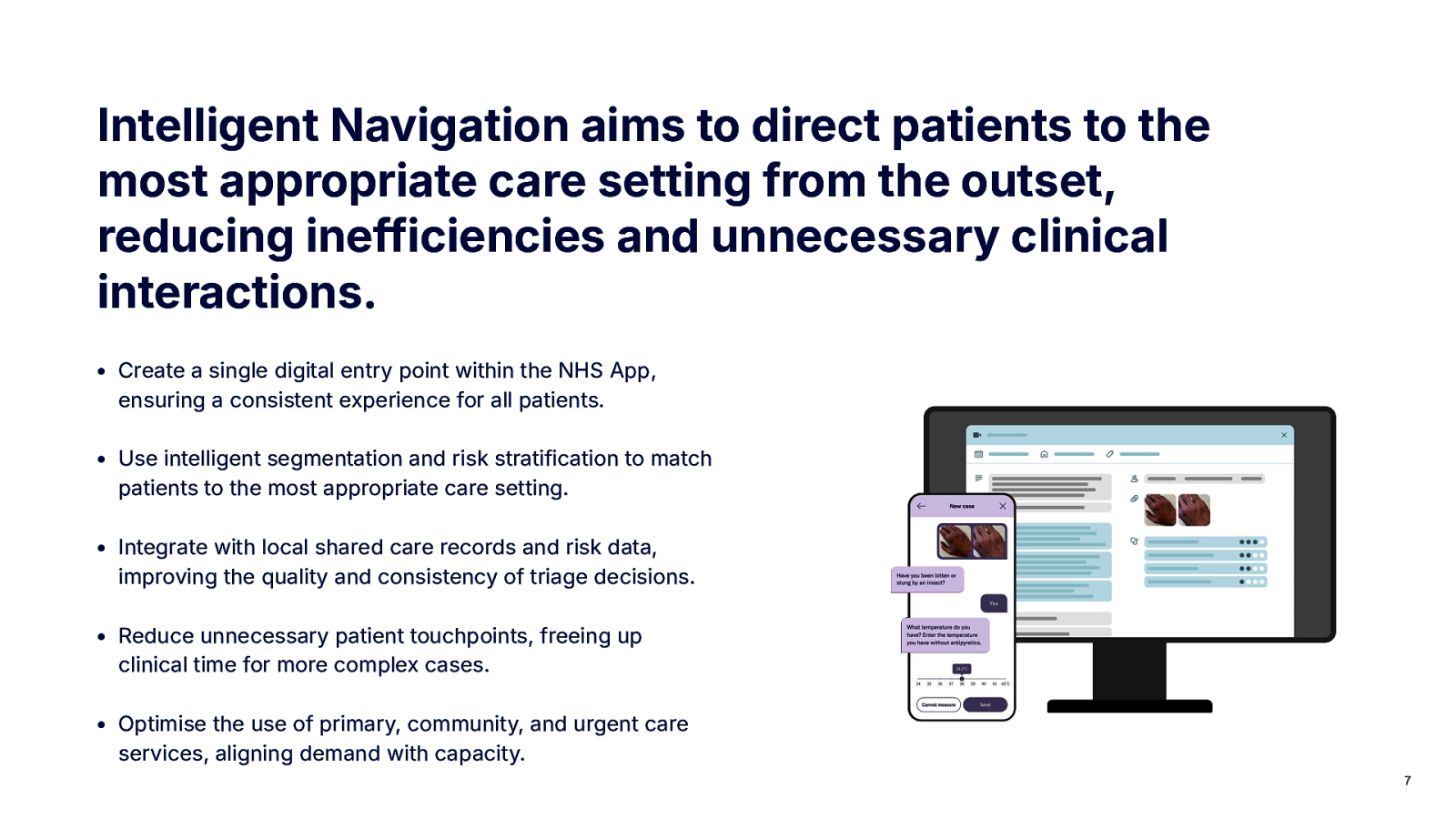
Intelligent Navigation aims to direct patients to the most appropriate care setting from the outset, reducing inefficiencies and unnecessary clinical interactions. • Create a single digital entry point within the NHS App, ensuring a consistent experience for all patients. • Use intelligent segmentation and risk stratification to match patients to the most appropriate care setting. • Integrate with local shared care records and risk data, improving the quality and consistency of triage decisions. • Reduce unnecessary patient touchpoints, freeing up clinical time for more complex cases. • Optimise the use of primary, community, and urgent care services, aligning demand with capacity. 7

This would represent a step change in how patients navigate their care. 9:41 AM 9:41 AM ? Good morning Mary 9:41 AM What do you need support with? 9:41 AM 9:41 AM ? ? What do you need support with? ? 9:41 AM 9:41 AM Case type ? Case type ? You are now leaving the NHS App 9:41 AM ? A clinician is reviewing your case ? Select an appointment Symptom or task Access local health services Results My recent activity SINGLE ACCESS POINT FILTER FOR ADMIN UNDERSTAND NEED HISTORY SYMPTOMS ACCESS SERVICES 8

Our hypothesis for unscheduled care Using what we know about the patient and their presenting symptoms will help guide us them to the most appropriate care more effectively. FROM: 9:41 AM ? Good morning Three ‘front doorsʼ for a patient to choose from Mary TO Making it easier to access the NHS by guiding patients to the right care. Access local health services Different triages looping the patient continuously to and from different service doors. Triage notes are not passed along to the next clinician, meaning the patient has to repeat themselves. My recent activity Patient need is established up front, alongside their history. Patient is navigated to the right care through a single choice, with data flowing through to the clinician. 9
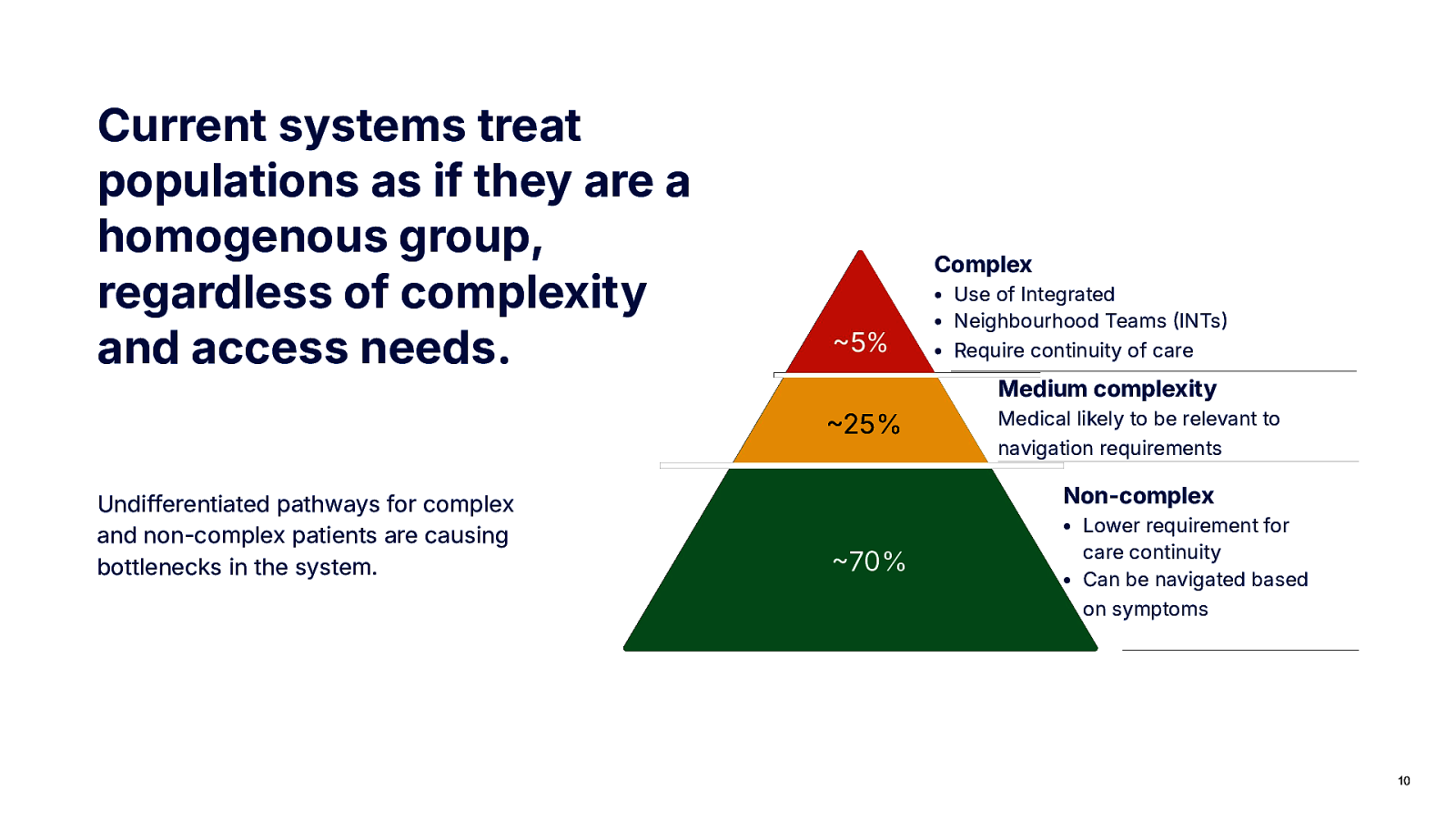
Current systems treat populations as if they are a homogenous group, regardless of complexity and access needs. Complex • Use of Integrated • Neighbourhood Teams INTs • Require continuity of care Medium complexity 25% Undifferentiated pathways for complex and non-complex patients are causing bottlenecks in the system. Medical likely to be relevant to navigation requirements Non-complex 70% • Lower requirement for care continuity • Can be navigated based on symptoms 10
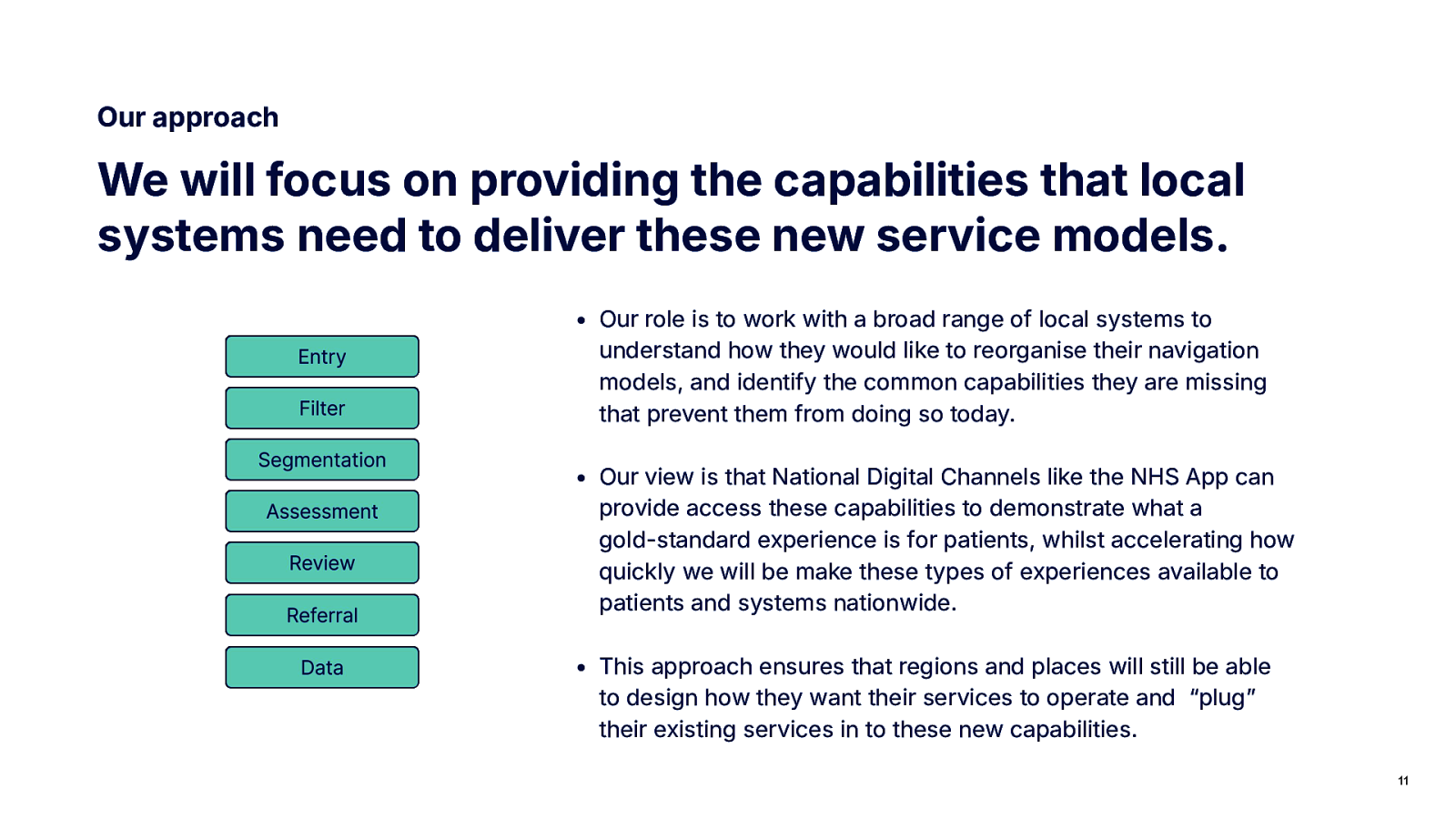
Our approach We will focus on providing the capabilities that local systems need to deliver these new service models. • Our role is to work with a broad range of local systems to understand how they would like to reorganise their navigation models, and identify the common capabilities they are missing that prevent them from doing so today. • Our view is that National Digital Channels like the NHS App can provide access these capabilities to demonstrate what a gold-standard experience is for patients, whilst accelerating how quickly we will be make these types of experiences available to patients and systems nationwide. • This approach ensures that regions and places will still be able to design how they want their services to operate and “plugˮ their existing services in to these new capabilities. 11

Our approach We plan to pilot across regions to understand which capabilities drive value and what we can deliver to allow for regional variation. 12
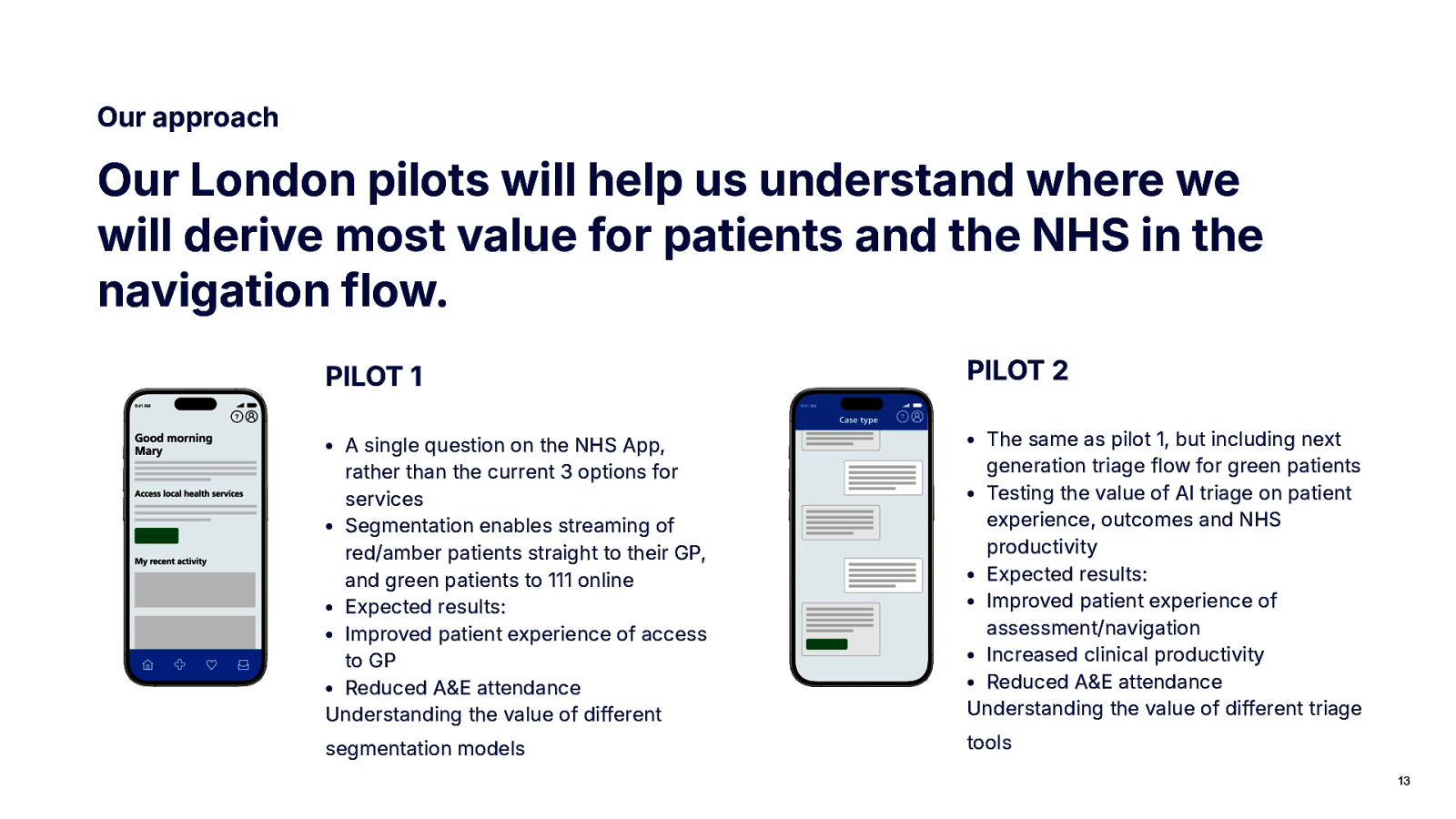
Our approach Our London pilots will help us understand where we will derive most value for patients and the NHS in the navigation flow. PILOT 1 PILOT 2 • A single question on the NHS App, rather than the current 3 options for services • Segmentation enables streaming of red/amber patients straight to their GP, and green patients to 111 online • Expected results: • Improved patient experience of access to GP • Reduced A&E attendance Understanding the value of different • The same as pilot 1, but including next generation triage flow for green patients • Testing the value of AI triage on patient experience, outcomes and NHS productivity • Expected results: • Improved patient experience of assessment/navigation • Increased clinical productivity • Reduced A&E attendance Understanding the value of different triage segmentation models tools 13
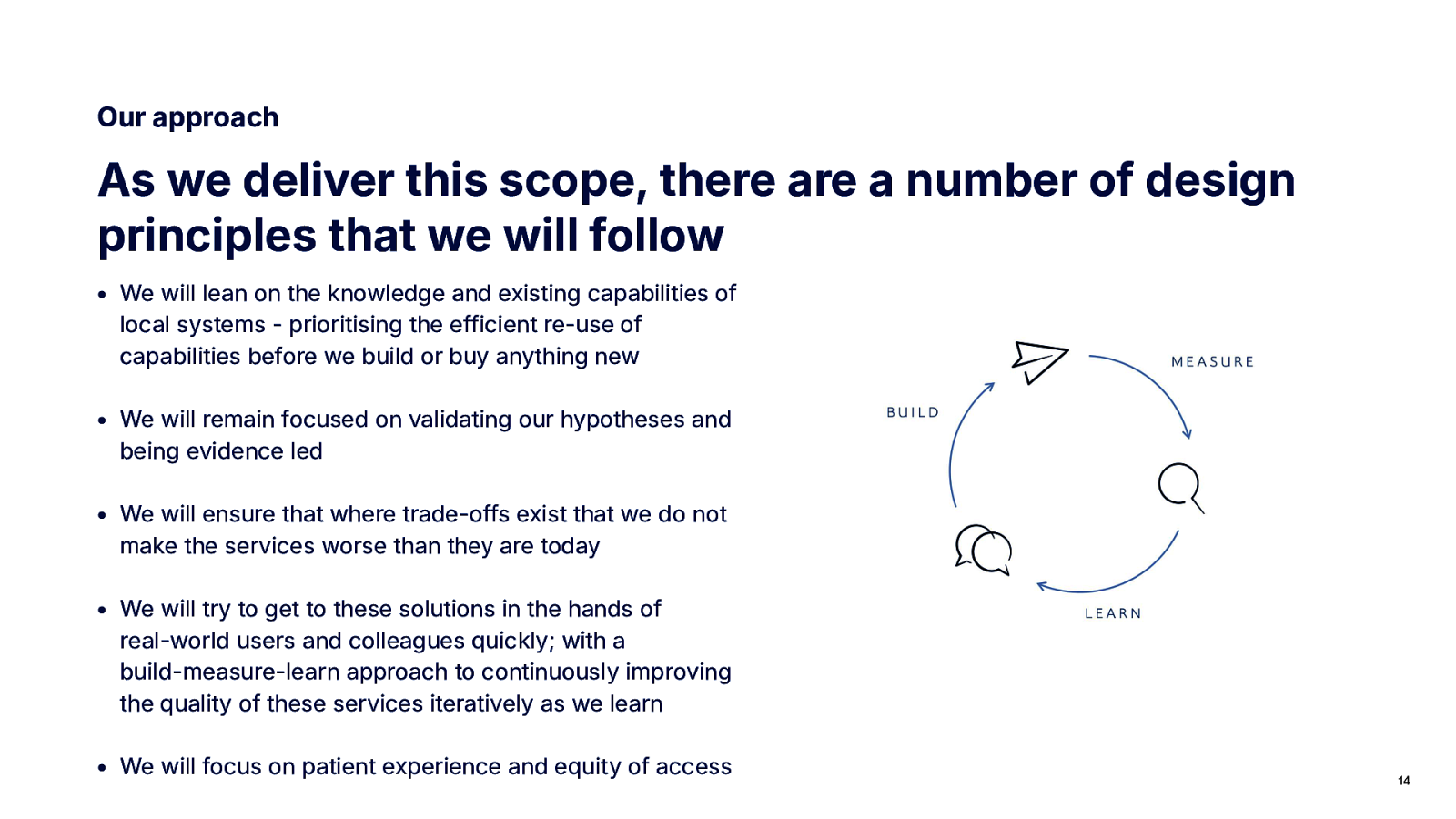
Our approach As we deliver this scope, there are a number of design principles that we will follow • We will lean on the knowledge and existing capabilities of local systems - prioritising the efficient re-use of capabilities before we build or buy anything new • We will remain focused on validating our hypotheses and being evidence led • We will ensure that where trade-offs exist that we do not make the services worse than they are today • We will try to get to these solutions in the hands of real-world users and colleagues quickly; with a build-measure-learn approach to continuously improving the quality of these services iteratively as we learn • We will focus on patient experience and equity of access 14

Value we will deliver We are being driven by key metrics relative to constitutional standards and the operating plan. 15

Who is involved? Our team consists of healthcare, digital and technical expertise spanning NHS England, Places and ICBs, as well as third party organisations and suppliers. 16
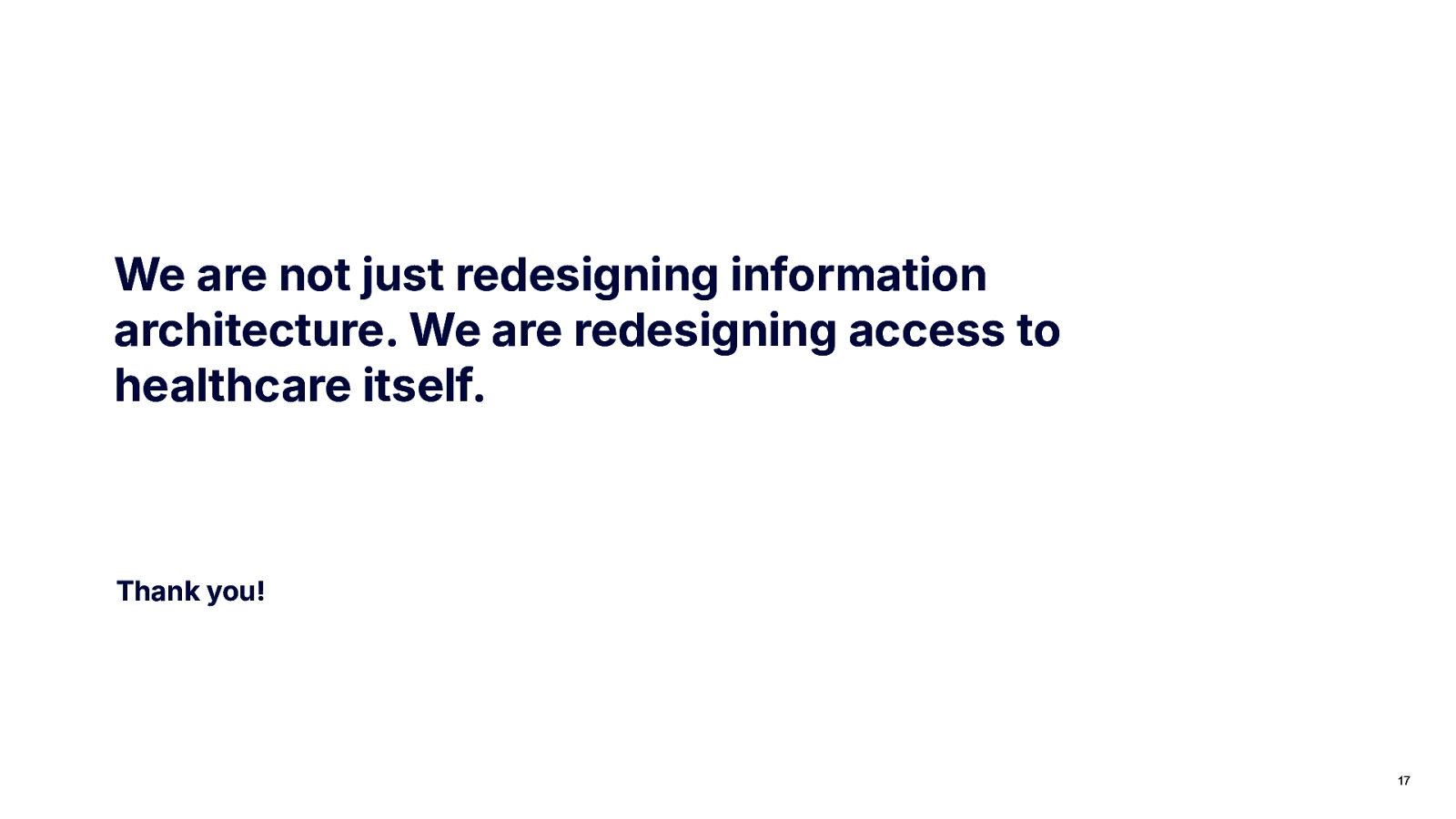
We are not just redesigning information architecture. We are redesigning access to healthcare itself. Thank you! 17